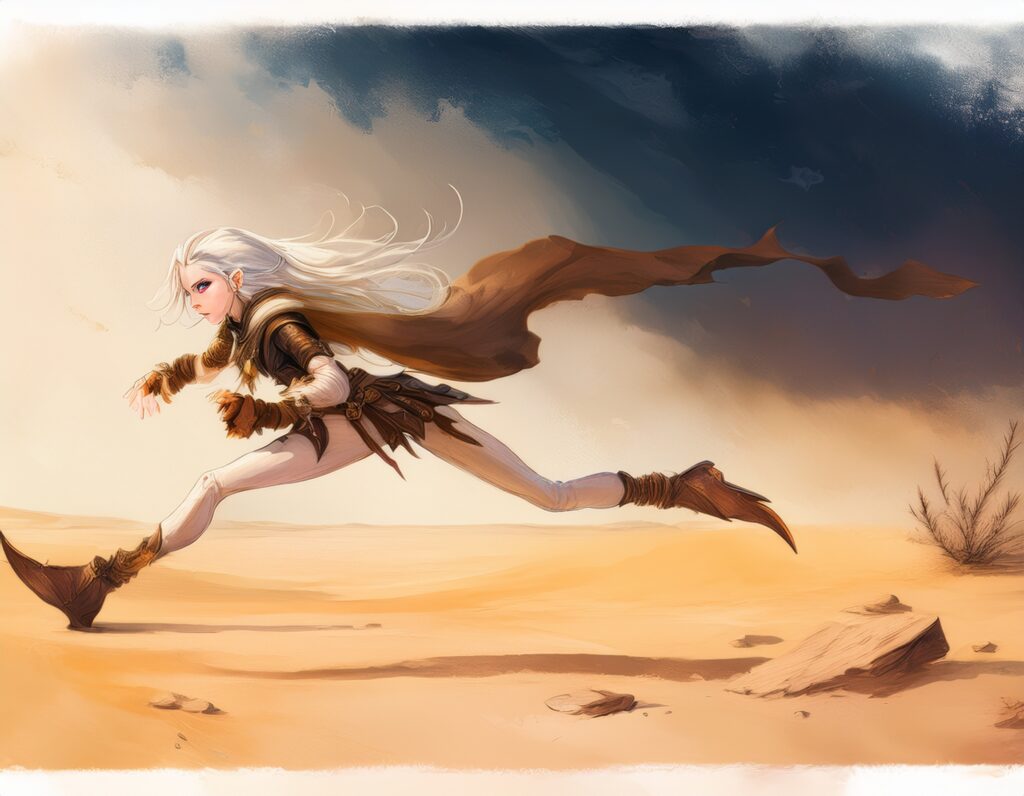Elf

Athas’ deserts, plains, steppes, and badlands are home to the elves, a long-limbed race of trading, raiding, thieving sprinters. Running is key to acceptance and respect among elves. Elves who are injured and cannot run are often left behind to die.
Personality: Elves are tireless wanderers forged in the endless desert, burned dark by the sun, toughened by the swirling sand, and given strength and speed by the constant wind. There’s no racial unity among them. Within a given tribe, all elves are brethren, but outsiders – even other elves – are regarded as potential enemies. Outsiders can be accepted and perhaps even become friends, but trust takes time to develop and is often associated with tests and great sacrifice. Other races see elves as dishonest and lazy; generally a fair assessment. Elves idle around for days until compelled to exert themselves, but they can run for days without complaint. No self-respecting elf will consent to ride an animal. To do so is dishonourable; elven custom dictates that individuals keep up or be left behind. Elves prefer to lead short, happy lives rather than long, boring ones. Seeing the future as a dark, deadly place, they prefer to live in “the now,” enjoying each fleeting moment. They thrive in open spaces and tend to wither in captivity.
Physical: Elves stand between 6 and 7 feet tall, with lean builds, and angular, deeply etched features. Elves have no facial hair but the locks atop their heads come in shades of lightest blond to darkest black. They dress in garb designed to protect them from the elements.
Relations: Elves tend to keep to their own tribe and proven friends unless they have some sort of an angle: something to sell or some deception to pass off. Strangers are potential enemies waiting to take advantage of them, so elves look for every opportunity to win the advantage. If an elf believes that a companion might make a worthy friend, the elf devises a series of “tests” of trust that allow the companion to prove that their friendship is “stronger than the bonds of death,” as elves say. Once a stranger has gained an elf’s trust, he is forever that elf’s friend. If this trust is ever betrayed, it is gone forever.
Lands: Elven tribes make a living either through herding, raiding, or trading; most tribes have at one time or another plied their hand at all three of these occupations. A tribe’s current occupation usually determines which lands they currently claim as their own. Elven herders claim grazing lands, where they tend their herds of kank, erdlu, and other livestock. Elven raiders claim lands crossed by trade routes. Elven traders claim no lands, but wander in search of bargains and loose purses. Some tribes spend different seasons following different pursuits, herding for one season, raiding for another, and trading their spoils another.
Language: Elves of Athas share a common language, although each tribe has its own distinct dialect. The elven language is filled with short, clipped words, runs with a staccato pace, and is difficult to pick up. Disdaining the tedious languages of other races, most elves condescend to learn the common tongue for trade. Elves that learn other tongues often hide their ability.
Elf Society: Elves have a tribal unity that does not extend beyond their own tribe. Elves from other tribes are considered potential enemies as much as any other creature. Within a tribe all elves are considered equal, with one exception – the chief. The chieftain of an elf tribe rules for life and makes all major decisions concerning the tribe. The method of choosing the chief varies from tribe to tribe, with some tribes electing the individual who demonstrates the most qualities of leadership, while the leadership in other elven tribes is a hereditary position.
When in the company of outsiders, elves create tests of trust and friendship for their companions. This continues until the companions fail a test, in which case they will never earn the elf’s trust, or they succeed in passing enough tests to convince the elf to accept them. Elven culture is rich, with elf song and dance being the most captivating in the Tablelands. They have turned celebrating into an art form. When a hunt goes well, a tribe showers the hunt master with praise. When a hunt goes poorly, the hunt master will find himself the target of ribald mockery. To elves, this is part of the tapestry of tribal expression. To celebrate a marriage, elves dance to the tales of long-remembered lovers. The depths of expression are so intense that elves believe that they are truly reliving the events in question. Despite their reputation as lazy, shiftless liars, elves do work. Though most elves provide for themselves and their tribe through herding, all elves have a propensity for raiding. Others become merchants and some become thieves. In many cases, others find it difficult to see the distinction. Though they detest hard labour, elves will spend hours negotiating with potential customers.
Role-playing Suggestions: In combat, rely on elven combat skills (distance, bows, and fighting by the light of the moons and stars). In other situations, trust to your non-combat skills and philosophies (running, escape from entangling situations). Never cede an advantage to your adversary, in combat or otherwise. Keep the ground shifting and always be the one to move first. Never ride on beasts of burden. Run everywhere you travel, even when running might prove slower or others in your party take animal or magical transportation. When someone professes to be your friend, dismiss them at first and then later, offer them a test of trust. Don’t tell them that it is a test, of course. Ask them to give you one of their prize possessions, for example, or leave your own valuables out and see if they take advantage of you. Pretend to sleep, and find out what they say about you when they think you are not listening. Some elves go as far as to allow themselves to be captured by enemies to see if the presumed friend will rescue them!
Remember the music that lies within the elven soul. Elves love song and dance and you naturally celebrate your victories in this fashion. Tragedies and defeats are likewise immortalised in song. The more painful the experience, the more beautiful the song. Live in the now. As the elven saying goes, eat now and pay later. Do not spend overlong on contemplation. Plans that cannot be brought to fruition before the sun rises are not worth considering. Life is short and death comes without warning, so live each moment as if it were your last. It might well be.
The following game statistics apply to the elf player
character:
Elf Racial Traits
+2 Dexterity, –2 Constitution, +4 Intelligence, : Elves are nimble, both in body and mind, but their forms are frail.
Medium: Elves are Medium creatures and have no bonuses or penalties due to their size.
Normal Speed: Elves have a base speed of 40 feet.
Low-Light Vision: Elves can see twice as far as humans in conditions of dim light.
Elven Immunities: Elves are immune to magic sleep effects and get a +2 racial bonus on saving throws against enchantment spells and effects.
Elven Magic: Elves receive a +2 racial bonus on caster level checks made to overcome spell resistance. In addition, elves receive a +2 racial bonus on Spellcraft checks made to identify the properties of magic items.
Keen Senses: Elves receive a +2 racial bonus on Perception checks.
Weapon Familiarity: Elves are proficient with longbows (including composite longbows), longswords and shortbows (including composite shortbows), and treat any weapon with the word “elven” in its name as a martial weapon.
Languages: Elves begin play speaking Common and Elven. Elves with high Intelligence scores can choose from the following languages: Celestial, Dwarven, Halfling, and Sylvan.
Desert-Born Elemental kin: Elves tribes align to one chosen Element Earh(acid), Air(lightning), Fire(Fire), Water(cold), Rain(Lightning), Sun(fire), Silt(acid) or Magma(fire). they gain energy resistance 5 in that associates element
Elf Run: Elves gain Run as a bonus feat.
